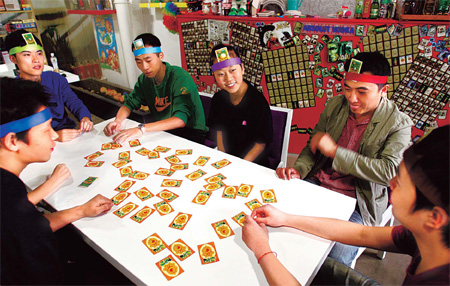Focus
Breaking free from virtual reality and Web of boredom
By Zhou Wenting and Peng Yining in Beijing (China Daily)
Updated: 2010-10-12 07:56
 |
Large Medium Small |
As time has passed, the popularity of Liu's traditional games, such as mahjong, Chinese chess and go, has waned among young people.
"It's natural for games to change rapidly from generation to generation," said Zhou Xiaozheng, a sociology professor at Renmin University of China. "All trends fade away with the time."
However, the surge in modern role-playing games could present an opportunity for traditional pastimes to make a comeback, say experts.
"To compete with the modern games, old-fashioned ones need to be revamped and updated to keep them relevant, which in turn will protect this traditional culture," said Xia at Peking University.
He argued that many games had been unchanged for centuries and now fail to meet the needs of young people.
"Games today have counters and cards designed exquisitely in rich colors and styles," said media worker Chen Wen. "We had classes to teach us go and chess at elementary school but few of us play them now because they are boring and old-fashioned. They're just for grandfathers."
As well as incorporating elements of modern culture, such as the latest movies or television shows, manufactures of the new card- and board-based role-playing games also include CDs and DVDs to heighten the experience.
Shan Xiali, 48, head of the Shanghai Chess Academy, said Chinese chess and go have no shortage of elderly and teenaged fans, but very few in the 20 to 30 age bracket.
"Chinese chess has a large number of adult enthusiasts, while children tend to flock to go. A monthly go contest in Shanghai attracts more than 3,000 applicants aged 5 to 16," she said. Shan attributed the unpopularity of traditional games among young people to the sheer diverse range of recreations available today, compared to the limited options of past generations.
Today, a novel game that involves a large group of people and more communication is what people want after eight hours of soundless work in front of a computer, she said.
Shan is now working on ways to revamp its games to make them more attractive to the modern players.
And although many young people admitted to China Daily that they do not play traditional Chinese games, most insisted they will not let the old pastimes vanish entirely.
"When I have a child, I will send him or her to learn Chinese chess," said Li Hanyi, 22, a bank clerk in Suzhou, Jiangsu province. "That way, my child will get a quintessence understanding of Chinese culture and a calm mentality."
|
Young people play Sanguosha at a bar in downtown Beijing. Nowadays many young people prefer to spend more time playing board and card games instead of going online, which sociologists say is a trend fueled by a desire to reconnect in the Internet age. "It's not unusual to see 20 people involved in one game," according to Chen Kai'en, who co-owns Gamebox in Shanghai. Photos by Zhang Wei / China Daily |
|
Sanguosha, also known as Killers of the Three Kingdoms, which made 20 million yuan ($3 million) in sales last year for makers Yoka Games, has won many fans in China. Using characters from the classic novel Romance of the Three Kingdoms, each player is given a different role with distinct skills and weapons. |


